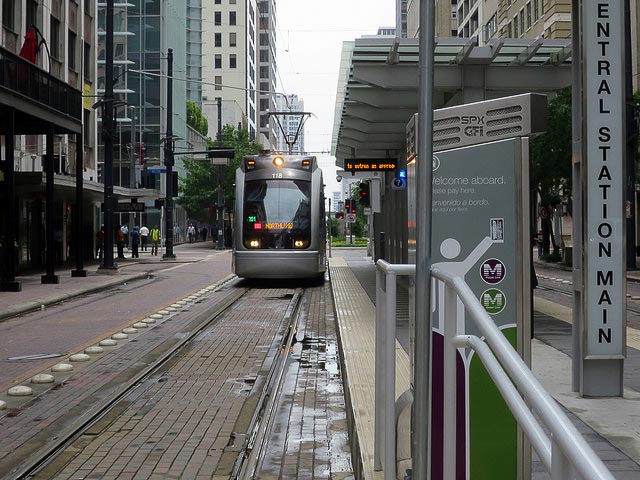 Image via flickr/Daniel Lobo.
Image via flickr/Daniel Lobo.
Houston METRO's new board chair, Carrin Patman invited a group of Houston-area transit bloggers to the agency's downtown headquarters last month to share her vision for the system -- and solicit suggestions.
Patman, tapped by Houston Mayor Sylvester Turner to lead the agency's board in March, is now in her second stint in the agency's leadership (she previously served on the board from 2010 to 2013).
An attorney at the law firm Bracewell, Patman comes from a political family -- she's the daughter and granddaughter of U.S. congressmen -- and said that the experience will serve her well as she navigates the politics of transportation in greater Houston. She shared five of her big ideas for the future of the agency during a roundtable discussion.
 Image via METRO
Image via METRO
1) Patman is focused on developing METRO Houston's regional transit plan. But she was coy when asked multiple times about when that plan would be crafted and released. "We really haven't had a regional transit plan since the 2003 referendum," Patman said, referring to the 2003 vote that authorized the agency to take on $640 million in bond debt to build out its light-rail system. As Patman explains, that level of bonding authority was negotiated in order to secure the support of the business community, which wanted to re-evaluate the success of those light-rail lines before allowing more bonds. Now, the agency is bumping up against that limit and may need to request more. "That's where we are now," Patman said. "We've used $500 million plus in bonding authority."
As the process for planning the next iteration of METRO's work unfolds, Patman said, a main priority will be figuring out how to connect Downtown with the Uptown area. That's complicated by the litigation surrounding the proposed Richmond line; the fact that the federal government has taken METRO's Richmond line out of the running for federal support; and the opposition to the project by U.S. Rep. John Culberson (R-Houston). Patman said the agency may explore a different route or bus rapid transit to connect Uptown and Downtown, among other ideas.
2) METRO sees fixing things outside of their vehicles -- namely sidewalks and bus stops -- as a critical way of boosting ridership. That means coordinating with lots of other players. "In order to have accessible shelters, you need to have the City of Houston fully on board," Patman said. She says METRO will be more involved in public and private planning efforts and suggested she wants to explore the idea of asking private developers to install bus shelters when they're making major improvements to their properties.
Tom Lambert, METRO's CEO, said the agency intends to create an urban design position on its staff. Already, METRO's planning staff is working to coordinate with the city's planning department, its public works department and the area's management districts on how to align sidewalk improvements with METRO's improved bus service. Lambert also discussed his interest in building out bus infrastructure at so-called "super stops" where multiple, high-frequency bus routes intersect and thus create busy transfer points.
While on the topic of coordination, Lambert also mentioned that METRO is working with Houston's public works department on a pilot project to give some buses signal priority -- technology that would reduce or eliminate the need for buses to wait at red lights -- in order to improve throughput. That technology could be particularly useful for dedicated bus lanes.
3) Patman is intrigued by the idea of connecting light-rail to Hobby airport. She didn't elaborate much but noted that the airport is only around 3 miles from the end of both of the new light-rail lines extending east of downtown. "I don't know what the exact route would be," Patman said as she mused on the topic. She was more skeptical of any sort of connection to George Bush Intercontinental Airport (IAH), given its further distance from the city's light rail lines and METRO's previous experience with a short-lived express bus serving the facility.
4) Patman believe METRO's bus network overhaul has left some people behind. METRO won national attention for an overhaul of its bus network that put a priority on frequent bus serve in areas likely to have high ridership. But METRO officials were somewhat candid at the time that the effort might come at the expense of service in some areas where ridership is quite low. Patman believes that's happened and suggested the agency might have swung the pendulum too far as it tried to find the balance between a system that maximizes ridership and one that covers the widest geographic area possible.
"Most people seem to be pleased and satisfied with it and feel their service has improved," Patman said of METRO's bus "re-imagining," but she added, "there are some people who have been left out." In particular she cited concerns about residents who may have no means of transportation beyond service METRO provides. "We're not going to leave people behind," she said. "Coverage is important for a public transit agency."
5) She wants to work closely with other jurisdictions, including those not served by METRO. The agency serves Harris County (and a small part of Fort Bend County), but Patman said she wants to coordinate with jurisdictions that aren't covered by METRO's footprint. In particular, she's interested in working with all the counties that make up the Houston-Galveston Area Council. "We have a responsibility to the broader region to get people to employment centers," Patman said. And collaboration is a necessity for political reasons too. She noted that H-GAC can weigh in on any federal grant proposals the agency makes, so it would behoove METRO to take a collaborative approach.

